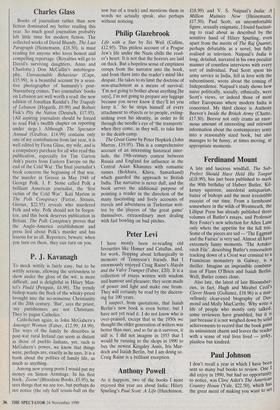Charles Glass
Books of journalism rather than new fiction dominated my better reading this year. So much good journalism probably left little time for modern fiction. The collected works of David Blundy, The Last Paragraph (Heinemann, £18.50), is must reading for anyone who loves honest and compelling reportage. (Royalties will go to David's surviving daughters, Anna and Charlotte.) Don McCullin's autobiogra- phy, Unreasonable Behaviour (Cape, £15.99), is a beautiful account by a sensi- tive photographer of humanity's post- Nuremberg crimes. Two journalists' books on Lebanon are well worth a read: the new edition of Jonathan Randal's The Tragedy of Lebanon (Hogarth, £9.99) and Robert Fisk's Pity the Nation (Deutsch, £17.95). (All aspiring journalists should be forced to read Fisk's twelfth chapter on reporting under siege.) Although The Spectator Annual (Grafton, £14.99) contains only one of my contributions from last year, it is well edited by Fiona Glass, my wife, and is a compulsory purchase for all who read this publication, especially for Tim Garton Ash's pieces from Eastern Europe on the end of the Cold War. The final journalist's book concerns the beginning of that war, the murder in Greece in May 1948 of George Polk. I. F. Stone called Polk a brilliant American journalist, the 'first victim of the Cold War'. Kati Marton in The Polk Conspiracy (Farrar, Strauss, Giroux, $22.95) reveals who murdered Polk and why. Polk should not be forgot- ten, and this book deserves publication in Britain. The Polk Conspiracy proves that the Anglo-America establishment and press lied about Polk's murder and has lessons for us all. Reporters, beware: when you turn on them, they can turn on you.


































































 Previous page
Previous page